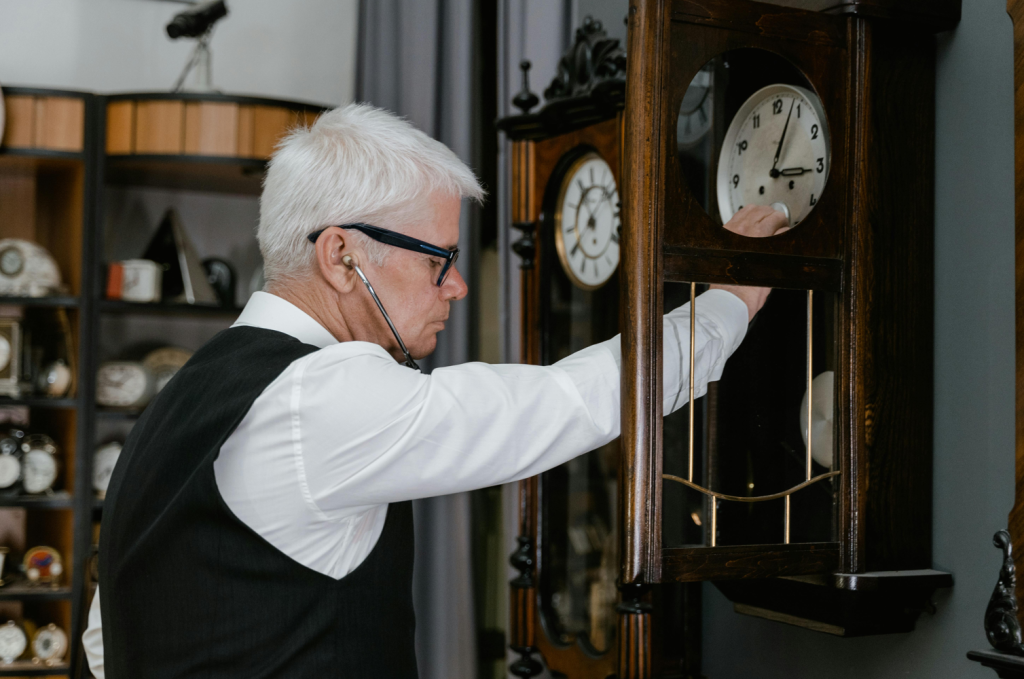Grandfather clocks have long been cherished as elegant timepieces and heirlooms passed down through generations. Known for their precision, intricate mechanisms, and timeless beauty, these clocks can last centuries—if properly cared for. One of the most essential steps in preserving their value and functionality is routine servicing. Just as a car needs regular maintenance to run smoothly, a grandfather clock requires scheduled care to remain accurate and in good condition.
Below, we’ll discuss why routine grandfather clock servicing is crucial for its longevity. Let’s dive in!
Preserving the Integrity of Mechanical Components
Inside every grandfather clock lies a sophisticated mechanical movement composed of gears, levers, and weights that work in perfect synchronization. Over time, dust and small particles can accumulate inside the movement, creating friction that gradually wears down these delicate components. Lubrication, which keeps the parts moving smoothly, also dries out over the years, leading to unnecessary strain on the clock’s mechanisms.
Routine servicing involves cleaning and oiling the internal parts to reduce friction and wear. Professional clockmakers carefully disassemble and inspect the movement, ensuring that no component is damaged or misaligned. By addressing minor issues early, regular servicing prevents costly repairs or part replacements in the future. This proactive care preserves the structural integrity of the clock and allows it to continue ticking accurately for decades.
Protecting the Accuracy of Timekeeping
One of the most common signs that a grandfather clock needs servicing is when it begins to lose or gain time. Even the most finely crafted clock can experience slight inaccuracies if not properly maintained. Dust buildup, worn bushings, or dried oil can interfere with the pendulum’s swing or the escapement’s rhythm, disrupting the clock’s precision.
During routine servicing, technicians calibrate and adjust the clock to ensure it keeps accurate time. This process involves regulating the pendulum, inspecting the escapement, and making subtle adjustments to ensure optimal performance. Regular maintenance ensures the clock not only looks beautiful but also functions as a reliable timepiece, maintaining its original craftsmanship and value.
Extending the Lifespan of Valuable Investments
Grandfather clocks are often expensive and hold significant sentimental value. Neglecting their maintenance can lead to severe mechanical damage that may be difficult—or even impossible—to reverse. Routine servicing acts as an insurance policy for your investment, preventing small problems from turning into major repairs.
A well-maintained clock can easily last 100 years or more, often being passed down through multiple generations. By committing to a consistent servicing schedule—typically every three to five years—you’re extending the lifespan of the clock and preserving its original character and worth. This longevity not only enhances its value as a family heirloom but can also increase its monetary worth over time.
Preventing Costly and Complex Repairs
Like any intricate mechanical device, grandfather clocks are most vulnerable when neglected. When lubrication fails, gears grind against each other, causing damage that can require expensive repairs or replacements. Additionally, worn parts left unchecked may lead to complete movement failure, which can be significantly more costly to fix than preventive maintenance.
Routine servicing allows clockmakers to identify worn bushings, loose parts, or misalignments before they escalate into serious problems. This preventive approach saves both time and money in the long run. Instead of facing large repair bills, owners can keep their clocks running smoothly with relatively simple and affordable maintenance visits.
Preserving Aesthetic and Emotional Value
Beyond their mechanical precision, grandfather clocks hold immense aesthetic and emotional significance. Their polished wood casings, intricate carvings, and resonant chimes create a sense of warmth and nostalgia in any home. Over time, environmental factors like humidity, dust, and temperature fluctuations can dull their appearance and affect their chime mechanisms.
Routine servicing often includes cleaning and polishing the case, checking the weights and chains, and ensuring the chimes ring clearly and correctly. This holistic care not only keeps the clock looking its best but also preserves its sentimental value. A well-maintained grandfather clock can continue to evoke cherished memories and enrich the atmosphere of your home.
Caring for a grandfather clock is about more than just keeping time; it’s about protecting a piece of history. Routine servicing helps ensure that every gear runs smoothly, every chime rings clearly, and every swing of the pendulum remains steady. Over the years, this consistent attention not only preserves the clock’s function but also its elegance and emotional significance.
While regular care at home is helpful, nothing replaces the precision and expertise of a trained clockmaker. Professionals have the knowledge, tools, and experience to identify issues early and keep the clock performing at its best. Reaching out to trusted experts for routine grandfather clock servicing, such as those from The Clock Doctor, is one of the most effective ways to safeguard its longevity, allowing your clock to continue marking life’s moments for generations to come.


